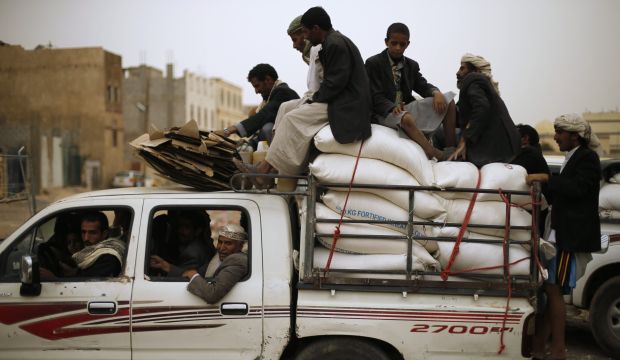
People ride atop a pick-up vehicle after they received foodstuff assistance from a World Food Program distribution center for people displaced by armed conflicts in northern Yemen, in Sana’a on July 21, 2014. (REUTERS/Khaled Abdullah)
Sources in Hadhramaut speaking on the condition of anonymity told Asharq Al-Awsat that the organization had distributed a flyer on Sunday and Monday that announced a ban on women visiting markets without a male chaperone. It also barred them from participating in sports.
The organization’s decree comes despite the fact that the Hadhramaut governorate, which stretches from the Gulf of Aden to the Saudi border, is known for its largely Sufi inhabitants’ strict adherence to conservative religious norms. Most women already wear the niqab, or full-face veil.
The sources said Al-Qaeda has been able to build a base of support among the governorate’s tribes, which launched a rebellion against what they claimed was the central government’s theft of Hadhramaut’s oil revenues in December 2013, after a tribal leader was shot dead by the Yemeni army.
The governorate has recently been the scene of a number of terrorist attacks, including an attack on a border post between Yemen and Saudi Arabia in the town of Wadia that killed a number of security officers at the beginning of July.
Other attacks targeted the airport in the provincial capital, Seiyun, as well as security and military posts in the area. AQAP has also been blamed for an attack that killed a number of women who worked at a date-processing factory in the province.
The Hadhramaut governorate is divided into two areas: the coastal area, which is more urbanized and produces the famous Du’ani honey, and the inland area, which is dominated by desert and mountainous terrain.
Terrorism experts say the actions of AQAP in Hadhramaut are an extension of its actions in other governorates in southern Yemen, such as Abyan and Shabwa, where similar “Islamic emirates” have been declared in recent years before government forces were able to re-assert control.
Meanwhile, the United Nations said on Monday that the humanitarian situation in Yemen’s Amran governorate remained precarious in the wake of clashes between Houthi insurgents on one side and the Yemeni army and pro-government forces on the other in previous weeks.
Houthi fighters captured the provincial capital, also named Amran, at the beginning of July in a series of clashes with Yemeni government forces, prompting thousands to flee the city and its surrounding areas.
A statement issued by the UN’s Office for the Coordination of Humanitarian Affairs in Sana’a said the situation was now calm and that “partners in the humanitarian effort are ready to return to Amran as long as the circumstances allowed it, and some aid is currently being delivered to those internally displaced people who are living in Sana’a.”
The UN said that verifying information from inside the province, which neighbors the capital, Sana’a, was still “extremely difficult” and that the humanitarian affairs coordinator hoped to move to Amran in the next few days.
The UN urged all parties to “adhere to the basic rules of humanitarian action in the areas affected by the conflict and guarantee the protection of civilians,” and to “negotiate in order to allow aid to reach the affected people and guarantee the delivery of aid to all those who need it,” and also urged all parties to commit to ensuring the safety of humanitarian workers.
During the fighting in Amran, Houthi forces captured the headquarters of the Yemeni Army’s 310th brigade. Medical sources at the military hospital said that the body of the brigade’s commander, Brig. Gen. Hamid Al-Qashibi, which was turned over to the government on Sunday, indicated that he had been tortured before being executed.
